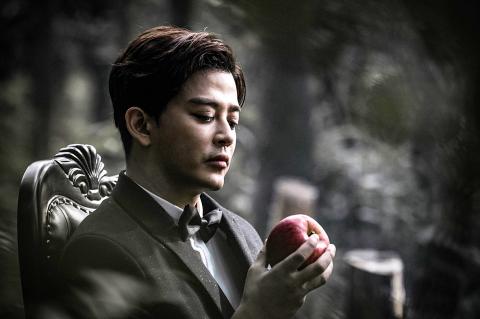A common problem with Taiwanese films is that they often start off with a grandiose, well executed opening — and the rest of the film never lives up to the hype. Karma’s (玩命貼圖) extremely gruesome first scene and creative credit sequence bodes the same promises, and fortunately it remains fairly consistent.
The gore is shown, no-holds barred, throughout the film and the pacing is reasonable, although a few of the deaths could have been left out for a more streamlined narrative. Overall, Karma tells a solid story that has few plot holes and a clear resolution, and while it’s not exactly groundbreaking, it is entertaining and does keep one on the edge of the seat by handling the suspense well, revealing information bit by bit in a logical manner and using plenty of foreshadowing that comes to make sense much later.
The story is not without its flaws, with plot holes such as how the teachers were able to snatch a dead student’s cell phone from a crime scene and keep it without the police noticing. But these errors are only noticeable if one pays full attention, and it’s not that kind of movie. It’s meant to be watched for fun.

Photo courtesy of Shine Time
Karma obviously draws heavily from the American Final Destination series, down to the shooting style, but Final Destination is about fate and cheating fate, while Karma is about, if the title isn’t obvious enough, karma. These people were not randomly chosen by “Death” as they were in the American series, but rather, their previous actions led to the final outcome.
While the script is solid, there’s much to gripe about the casting. Several of the “students” look too old to be in high school, especially the main female student played by Lan Ya (藍婭), whose actual age is unknown as there is little information about her on the Internet. In fact, it seems like many of these are first-time or unknown actors as they have a thin online presence. Their acting chops range from so-so to cringeworthy, and one wonders if the director couldn’t have just found people who looked the part since the ones he chose didn’t impress anyway.
The adult characters for the most part perform decently, but Lorene Jen (任容萱) simply doesn’t have enough of a presence to be the one spearheading the whole investigation. She seems oddly detached even as horrible things are happening, and it’s hard to connect with her, which is crucial as she’s later involved in a significant plot twist.

Photo courtesy of Shine Time
And late 1990s Cantopop heartthrob Daniel Chan (陳曉東) plays an extremely cheesy god of death (Sariel) who serves no purpose but to briefly appear at the beginning and end to deliver trite statements on life and death in an echoing, effects-laden voice that should only belong in trashy B-movies of the 1980s.
While the characters are dealing with an formless “Death” in the Final Destination series, Chan’s character has absolutely no role in the plot, and is obviously included and billed as one of the main cast just for his star power. The movie should end when the mystery is revealed and conflicts resolved, but Chan just has to jump out and ruin things.
The only actor who truly shines is veteran funnyman Mario Pu (馬力歐), who plays the sleazy and calculating Principal Sun in such a hilarious yet painfully realistic way that he seems to be the most complex character here despite playing a minor part. One cannot help but burst out in laughter when Sun puts a lifesize figure of himself in a bowtie flashing a huge smile on the sign for a school music competition, one that he adamantly decides to go forward with, despite all the deaths in school, for personal gain of course.
It’s a half-decent film for this genre, and Taiwan’s film industry has come a long way with its recent thrillers. However, despite Karma receiving considerable attention on the festival circuit, there’s still a long way to go before Taiwanese horror becomes as internationally acclaimed as its Japanese and Korean counterparts.

The canonical shot of an East Asian city is a night skyline studded with towering apartment and office buildings, bright with neon and plastic signage, a landscape of energy and modernity. Another classic image is the same city seen from above, in which identical apartment towers march across the city, spilling out over nearby geography, like stylized soldiers colonizing new territory in a board game. Densely populated dynamic conurbations of money, technological innovation and convenience, it is hard to see the cities of East Asia as what they truly are: necropolises. Why is this? The East Asian development model, with

June 16 to June 22 The following flyer appeared on the streets of Hsinchu on June 12, 1895: “Taipei has already fallen to the Japanese barbarians, who have brought great misery to our land and people. We heard that the Japanese occupiers will tax our gardens, our houses, our bodies, and even our chickens, dogs, cows and pigs. They wear their hair wild, carve their teeth, tattoo their foreheads, wear strange clothes and speak a strange language. How can we be ruled by such people?” Posted by civilian militia leader Wu Tang-hsing (吳湯興), it was a call to arms to retake

Desperate dads meet in car parks to exchange packets; exhausted parents slip it into their kids’ drinks; families wait months for prescriptions buy it “off label.” But is it worth the risk? “The first time I gave him a gummy, I thought, ‘Oh my God, have I killed him?’ He just passed out in front of the TV. That never happens.” Jen remembers giving her son, David, six, melatonin to help him sleep. She got them from a friend, a pediatrician who gave them to her own child. “It was sort of hilarious. She had half a tub of gummies,

The wide-screen spectacle of Formula One gets a gleaming, rip-roaring workout in Joseph Kosinski’s F1, a fine-tuned machine of a movie that, in its most riveting racing scenes, approaches a kind of high-speed splendor. Kosinski, who last endeavored to put moviegoers in the seat of a fighter jet in Top Gun: Maverick, has moved to the open cockpits of Formula One with much the same affection, if not outright need, for speed. A lot of the same team is back. Jerry Bruckheimer produces. Ehren Kruger, a co-writer on Maverick, takes sole credit here. Hans Zimmer, a co-composer previously, supplies the thumping